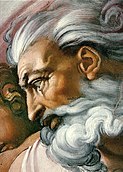
Back God Afrikaans Gott ALS Кудай ALT እግዚአብሔር Amharic Dios AN God ANG ईश्वर ANP الله Arabic ܐܠܗܐ ARC الله ARZ
God is a being or spirit worshipped as a deity. God is considered to be the creator of the universe in some religions. Theists believe that God created everything that exists and has ever existed. Some theists think God is immortal (cannot die) and has power without limits.[1] Deism is the belief that God exists, but God does not very often change or never changes things in the universe. Pantheism is the belief that the universe is God, while atheism is the belief that there are no deities. Agnostics think we cannot know for sure whether God or gods exist, but still might (or might not) believe at least one deity exists. People who believe that the word "God" should be defined before taking a theological position are ignostic.
In some religions, there is only one deity, God. This is called monotheism. Some monotheistic religions are the Abrahamic religions (Christianity, Judaism, and Islam), the Bahá'í Faith, and Sikhism. In other religions there are many gods. This is polytheism. Some polytheistic religions are Hinduism, Shinto, Taoism, paganism, Wicca and some variants of Buddhism. Some say that there is one God who can come in many forms, or that there is one God that is more powerful than the other gods.
In philosophy and theology, people normally write about a God that has a personality but no body and is everywhere at once; that God made the world and time and is separate from the world; that no-one made God; that God knows everything and has all power; that God is both free and good; and that God is perfect and the start of all morality.
There are different names for God in different religions. Some examples are Yahweh, Elohim in Judaism and Christianity, Allah in Islam, Baha in Bahá'í Faith, and Ahura Mazda in Zoroastrianism.[2]
In English, people may write the words "god" and "gods" in lowercase letters. People that believe in only one god (monotheists) like to write God with a capital letter. Some people that believe in more than one god (polytheists) also like to use capital letters when writing about their gods. Most people that believe in God or gods do not believe in the gods of other religions.
- ↑ Swinburne, R.G. (1995), "God", in Honderich, Ted (ed.), The Oxford Companion to Philosophy, Oxford University Press,
...most philosophical theologians... have generally regarded him as a personal being, bodiless, omnipresent, creator and sustainer of any universe there may be, perfectly free, omnipotent, omniscient, perfectly good, and a source of moral obligation; who exists eternally and necessarily...
. - ↑ "10 Powerful Names of God (And What They Mean for Us Today)".
© MMXXIII Rich X Search. We shall prevail. All rights reserved. Rich X Search





